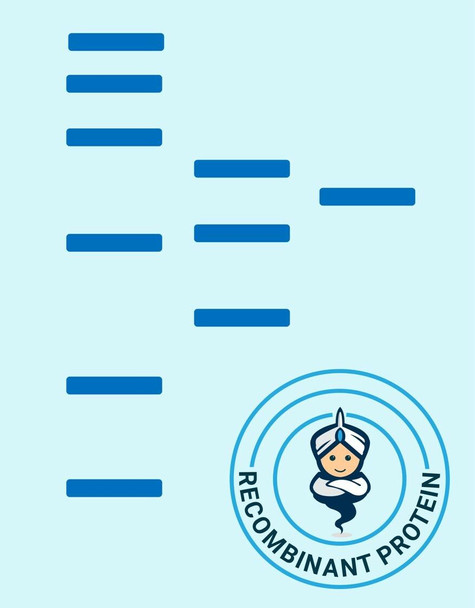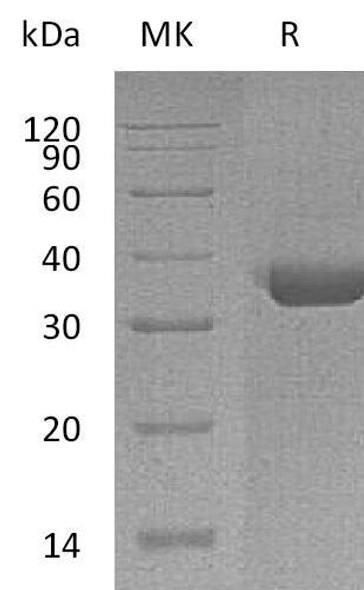Enzymes Recombinant Proteins
Human TPSAB1 Recombinant Protein (RPPB2343)
- SKU:
- RPPB2343
- Product Type:
- Recombinant Protein
- Species:
- Human
- Uniprot:
- Q15661
- Research Area:
- Enzymes
Description
| Product Name: | Human TPSAB1 Recombinant Protein |
| Product Code: | RPPB2343 |
| Size: | 10µg |
| Species: | Human |
| Target: | TPSAB1 |
| Synonyms: | Tryptase alpha/beta-1, TPSAB1, TPS1, TPS2, TPSB1, Tryptase I, Tryptase alpha-1. |
| Source: | Sf9 Insect cells |
| Physical Appearance: | Sterile Filtered colorless solution. |
| Formulation: | TPSAB1 protein solution (0.5mg/ml) contains Phosphate Buffered Saline (pH 7.4) & 20% glycerol. |
| Stability: | Store at 4°C if entire vial will be used within 2-4 weeks. Store, frozen at -20°C for longer periods of time.�For long term storage it is recommended to add a carrier protein (0.1% HSA or BSA).�Avoid multiple freeze-thaw cycles. |
| Purity: | Greater than 90.0% as determined by SDS-PAGE. |
| Amino Acid Sequence: | IVGGQEAPRS KWPWQVSLRV HGPYWMHFCG GSLIHPQWVL TAAHCVGPDV KDLAALRVQL REQHLYYQDQ LLPVSRIIVH PQFYTAQIGA DIALLELEEP VNVSSHVHTV TLPPASETFP PGMPCWVTGW GDVDNDERLP PPFPLKQVKV PIMENHICDA KYHLGAYTGD DVRIVRDDML CAGNTRRDSC QGDSGGPLVC KVNGTWLQAG VVSWGEGCAQ PNRPGIYTRV TYYLDWIHHY VPKKPHHHHH H |
Tryptase alpha/beta-1 (TPSAB1) is a tryptase which is the key neutral protease present in mast cells and is discharged upon the coupled activation-degranulation response of this cell type. TPSAB1 is enzymatically active only as a heparin-stabilized tetramer, and is resistant to all known endogenous proteinase inhibitors. TPSAB1 is implicated as a mediator in the pathogenesis of asthma and other allergic and inflammatory disorders.
TPSAB1 produced in Sf9 Baculovirus cells is a single, glycosylated polypeptide chain (31-275 a.a.) and fused to a 6 aa His Tag at C-terminus containing a total of 251 amino acids and having a molecular mass of 28.2kDa.TPSAB1 shows multiple bands between 28-40kDa on SDS-PAGE, reducing conditions and purified by proprietary chromatographic techniques.�
| UniProt Protein Function: | TPSAB1: Tryptase is the major neutral protease present in mast cells and is secreted upon the coupled activation-degranulation response of this cell type. Belongs to the peptidase S1 family. Tryptase subfamily. 2 isoforms of the human protein are produced by alternative splicing. |
| UniProt Protein Details: | Protein type:Secreted, signal peptide; EC 3.4.21.59; Protease; Secreted Chromosomal Location of Human Ortholog: 16p13.3 Cellular Component: extracellular matrix; extracellular space; extracellular region Molecular Function:protein binding; serine-type peptidase activity; serine-type endopeptidase activity Biological Process: extracellular matrix disassembly; extracellular matrix organization and biogenesis; defense response; proteolysis |
| NCBI Summary: | Tryptases comprise a family of trypsin-like serine proteases, the peptidase family S1. Tryptases are enzymatically active only as heparin-stabilized tetramers, and they are resistant to all known endogenous proteinase inhibitors. Several tryptase genes are clustered on chromosome 16p13.3. These genes are characterized by several distinct features. They have a highly conserved 3' UTR and contain tandem repeat sequences at the 5' flank and 3' UTR which are thought to play a role in regulation of the mRNA stability. These genes have an intron immediately upstream of the initiator Met codon, which separates the site of transcription initiation from protein coding sequence. This feature is characteristic of tryptases but is unusual in other genes. The alleles of this gene exhibit an unusual amount of sequence variation, such that the alleles were once thought to represent two separate genes, alpha and beta 1. Beta tryptases appear to be the main isoenzymes expressed in mast cells; whereas in basophils, alpha tryptases predominate. Tryptases have been implicated as mediators in the pathogenesis of asthma and other allergic and inflammatory disorders. [provided by RefSeq, Jul 2008] |
| UniProt Code: | Q15661 |
| NCBI GenInfo Identifier: | 18202508 |
| NCBI Gene ID: | 7177 |
| NCBI Accession: | Q15661.1 |
| UniProt Secondary Accession: | Q15661,P15157, Q15663, Q6B052, Q9H2Y4, Q9H2Y5, Q9UQI1 D2E6R9, D2E6S1, |
| UniProt Related Accession: | Q15661 |
| Molecular Weight: | Observed MW: 31kDaCalculated MW: 29kDa/30kDa |
| NCBI Full Name: | Tryptase alpha/beta-1 |
| NCBI Synonym Full Names: | tryptase alpha/beta 1 |
| NCBI Official Symbol: | TPSAB1�� |
| NCBI Official Synonym Symbols: | TPS1; TPS2; TPSB1�� |
| NCBI Protein Information: | tryptase alpha/beta-1; tryptase I; tryptase-1; tryptase-I; tryptase-III; tryptase beta 1; tryptase beta I; tryptase beta-1; tryptase alpha-1; tryptase alpha II; mast cell beta I tryptase; mast cell alpha II tryptase |
| UniProt Protein Name: | Tryptase alpha/beta-1 |
| UniProt Synonym Protein Names: | Tryptase I; Tryptase alpha-1 |
| Protein Family: | Tryptase |
| UniProt Gene Name: | TPSAB1�� |
| UniProt Entry Name: | TRYB1_HUMAN |






